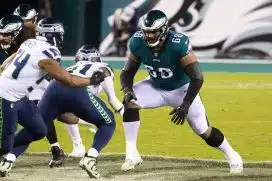By Tom Long, Sports Talk Philly staff writer
The season is over for the Philadelphia Eagles, a season where, in many ways, outperformed the expectations for the team.
The Eagles can be evaluated in several ways — by final record, offensive performance, defensive performance and coaching.
These will each be evaluated in no scientific or particular method, however, I will look at some statistics and consider the general eye test from the season — in my opinion, the most useful evaluation tool.
Final Record - B+
The Philadelphia Eagles ended the season 7-9 — placing them fourth in the NFC East. The expectations entering the season for this division were fairly low. The Eagles finishing the season a 7 win team was slightly out of reach for many to consider reasonable. The sudden beginnings of the Carson Wentz era, due to the Sam Bradford trade, left me wondering if the Eagles were capable of five wins. Heck, this even caused me to bet a friend that the Jacksonville Jaguars would finish with more victories.
The NFC East suddenly became a powerhouse for the conference behind the best offensive line in the league, with the success of Dallas Cowboys rookies Dak Prescott and Ezekiel Elliott. The Cowboys finished the season 13-3.
The New York Giants managed to finish the season 11-5 behind Eli Manning, Odell Beckham Jr. and a stronger and improved defense.
These two teams had the two best records in the conference, contributing to the Eagles 2-4 record in the division. Taking all of these factors into account, the Eagles managed to finish the season respectably.
Offense – C
The Eagles finished the season 22nd in offensive yards per game. The Eagles, who early on looked effective, struggled mightily on offense. A huge contributor to this was the offensive play calling. Wentz, a rookie, should not be asked to throw the ball 40 times a game, which he did eight times. However, the Eagles rank 10th in rushing attempts.
So where does the offense go wrong?
The Eagles averaged 4.1 yards per carry, ranking the team 18th. The rushing attack was, for the most part, ineffective.
It also becomes more difficult to have an effective rush game without a three-down tailback. It is often hard to juggle multiple backs, like the Eagles did with Wendell Smallwood, Ryan Matthews, Kenjon Barner and Darren Sproles. No other team in the NFL had this approach to running the football this season.
The Eagles receivers vastly improved in the second half of the season. There is no need to be reminded of the struggles Nelson Agholor had or any of the other receivers for that matter. The important part is that the Eagles did not finish last in dropped passes, an accomplishment in itself.
Simply put, the Eagles offense was not good. The reasons go beyond statistics because the offense struggled at times when they needed to thrive.
Defense – B-
The Eagles defense was a Jekyll and Hyde kind of tale this season. Defensive coordinator Jim Schwartz’s defense showed glimpses of success, checking in at 20th in yards allowed per game. This is generally a solid place to be. They also rank in the bottom third of the league in defensive penalties. Most impressively, and to my surprise, the Eagles rank 30th in number of defensive scrimmage plays, ultimately meaning they spend less time on the field.
Continuing to look through the Eagles defensive team stats, there is nothing that stands out about them, placing themselves in the middle 25 percent in almost every category. At times, it seemed as if the team’s defense was a total disaster.
The Eagles defense was also not great, but not terrible. Better play from Fletcher Cox and the pass rush could propel them to a higher grade.
Coaching – B
This was easily the most difficult area to hand out a grade to the team's coaching, in this case, referring to the talent compiled by the staff and the effectiveness of the given talent.
Head coach Doug Peterson, a first-year coach, did a solid job overall. Peterson did the best with the talent he had, which at some positions, wasn’t much. My biggest gripe with Peterson was the lack of commitment to a running back throughout the season. I believe it is much like choosing a starting quarterback. Peterson needed to select the running back that he believed had the most potential and use him. It doesn’t even matter who he chooses, just pick someone.
Running backs need consistency to find themselves in rhythm in order to produce the best results. Peterson did not allow any of his options to do this.
Schwartz, a former head coach, controlled the Eagles defense this season. Overall, Schwartz did a good job of mixing up the play calls and confusing elite quarterbacks at times. I believe the ball is in the players' court to execute the plays effectively and efficiently.







